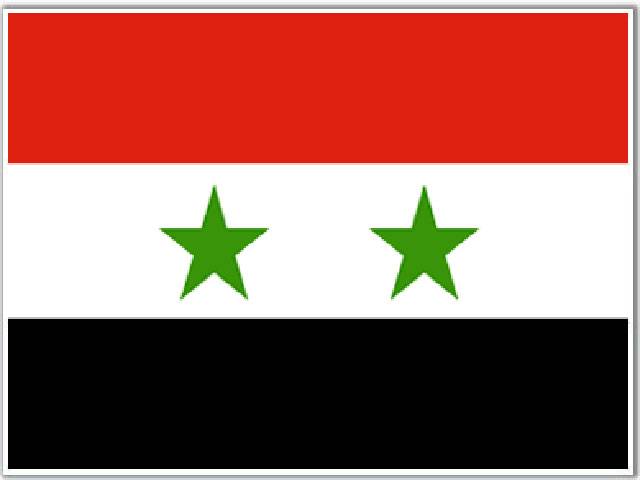BEIRUT/PARIS - Clashes raged in southern Damascus on Saturday, a monitoring group said, as rebels and regime troops exchanged mortar fire in the Yarmuk Palestinian refugee camp on the edges of the capital.
Elsewhere, Syria’s air force dropped deadly explosive-filled barrels on rebel-held areas, said the Syrian Observatory for Human Rights.
In rebel-held Harasta east of Damascus, shelling by regime forces killed at least nine civilians including four women and four children, said the Britain-based watchdog. In eastern Syria, after battles lasting several weeks, rebels seized control of Hamdan airport in the town of Albu Kamal in Deir Ezzor province on the border with Iraq, said the Observatory.
Syria’s military had used the agricultural airport as a base for helicopter gunships. Rebels also seized several tanks and mortars the army had stored there.
Most of Saturday’s air strikes targeted Idlib province in the northwest, Aleppo in the north and Damascus province. All three provinces are home to highly organised rebel groups.
In southern Damascus, rebels and troops clashed in Yarmuk and Tadamun district, where anti-regime sentiment is strong.
At least five civilians and two rebels were killed in Damascus on Saturday, the Observatory said State television said rebels shelled the mainly Christian and Druze district of Jaramana in southeastern Damascus, killing six people.
Warplanes also buzzed the Eastern Ghuta area, east of Damascus, said the Observatory, as regime forces cut several roads leading to the capital.
In Aleppo, two rebels were killed and regime forces launched several air strikes near the embattled city, including on the towns of Hreitan and Anadan, the Observatory said.
Warplanes also targeted the strategic town of Maaret al-Numan, which rebels captured on October 9, and which lies on the road linking Damascus to Aleppo. Despite near-daily air strikes and combat on the town’s edges, the army has been unable to recapture it. At least 47 people were killed across Syria on Saturday - 29 civilians, one soldier and 17 rebels - said the Observatory which relies on a network of activists, doctors and lawyers for its information.
More than 39,000 people have been killed in violence nationwide since the outbreak of the anti-regime revolt in March last year, it says.
On political front, France boosted its support for Syria’s new opposition coalition with a promise to let it appoint an envoy to Paris, but remained cautious about supplying weapons to rebels trying to oust President Bashar al-Assad.
France has been one of Assad’s harshest critics and this week became the first Western country to recognise the opposition coalition - formed last weekend in Doha - as the sole representative of the Syrian people.
President Francois Hollande met the coalition’s leader Ahmed Moaz al-Khatib in Paris on Saturday and afterwards told reporters that he planned to let the group appoint an ambassador to the French capital.
The post is to be filled by Monzer Makhous, an academic, although it was unclear if this would happen before the transitional government was formed.
Khatib for his part repeated his coalition’s promise to build a transitional government composed of technocrats rather than politicians, and said it would include representatives of all Syria’s ethnic and religious groups.
“There is no problem. The coalition exists and we will launch a call for candidates to form a government of technocrats that will work until the regime falls,” Khatib told reporters.
But he appeared to have made little progress on his call for the West to arm the revolt which has led to an estimated 39,000 deaths since it began 20 months ago.
“The (rebel) Syrians need military means but the international community also has to exercise control,” Hollande said, while acknowledging that France cannot act without agreement from its partners in the European Union, which has a strict embargo on arms deliveries to Syria.
EU foreign ministers were set to discuss the embargo at talks in Brussels on Monday.
France’s Foreign Minister Laurent Fabius said Thursday he would raise the idea of modifying the embargo to exclude defensive weapons for the rebels to help them protect areas they hold from bombardment by forces loyal to Assad.
“The protection of liberated zones can only be done in the framework of the international community,” Hollande said after meeting Khatib. “Once an alternative government has been formed, it can itself legitimately call for protection and support.”
Hollande noted that Khatib, a Sunni imam, had assured him that the future government would include Christians and Alawites, the minority group to which Assad belongs.
France, Turkey and the Gulf states have so far granted official recognition to the new Syrian grouping, and British Foreign Secretary William Hague, who met Khatib in London on Friday, said Britain was considering following suit.
Saturday, April 20, 2024
Violence rages across Syria

8:27 AM | April 19, 2024
8:09 AM | April 19, 2024
Pak economy improving, funds will be provided on request: IMF
9:57 PM | April 19, 2024
Minister advocates for IT growth with public-private collaboration
9:57 PM | April 19, 2024
Judges' letter: IHC seeks suggestions from all judges
9:55 PM | April 19, 2024
Formula 1 returns to China for Round 5
9:05 PM | April 19, 2024
Germany head coach Julian Nagelsmann extends contract till 2026 World Cup
9:00 PM | April 19, 2024
A Tense Neighbourhood
April 19, 2024
Dubai Underwater
April 19, 2024
X Debate Continues
April 19, 2024
Hepatitis Challenge
April 18, 2024
IMF Predictions
April 18, 2024
Kite tragedy
April 19, 2024
Discipline dilemma
April 19, 2024
Urgent plea
April 19, 2024
Justice denied
April 18, 2024
AI dilemmas unveiled
April 18, 2024
ePaper - Nawaiwaqt
Advertisement
Nawaiwaqt Group | Copyright © 2024





